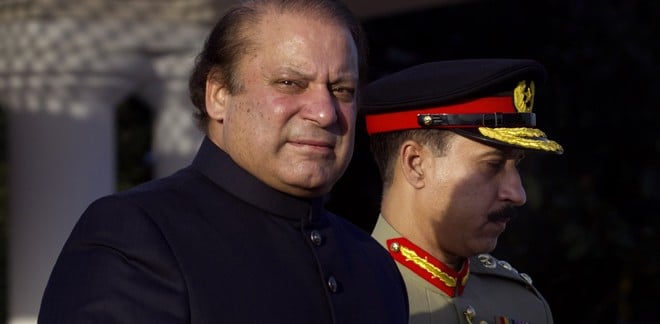

The indictment of Pervez Musharraf in treason case by a special court on March 31, 2014 was a defining day in the country’s history, according to Defence Minister Khawaja Asif. "Today, we have achieved another milestone towards democracy, which seemed to be a distant dream, but the judiciary has transformed it into reality," he said while addressing the Lower House of the Parliament.
A day later, on April 1, 2014, the government denied granting permission to Musharraf to travel abroad, which was believed to be a civil-military ‘agreement’ -- that once Musharraf is indicted he would be allowed to leave the country.
However, the indictment has ensued a new kind of a civil-military tussle in the country. The military leadership is unhappy with the defence minister. On April 7, the army chief issued a strong statement, saying the "…army would preserve its honour at all costs".
Political forces in Pakistan have been trying to keep the army at bay since the 2008 general elections. They succeeded in forcing Musharraf to quit the office of presidency. But with the democratic transition still in infancy, the PPP government was ‘forced’ to let Musharraf quit ‘honourably’, with a televised speech and a guard of honour before he went into self-exile.
The year 2011 was the most happening for civil-military relationship. Osama bin Laden was killed in the garrison city of Abbotabad in the US army operation. The military leadership was invited to the parliament for an in-camera briefing over the OBL operation. This was followed by the Memo case, targeting President Zardari and others. The then Prime Minister Yousaf Raza Gilani criticised the ISI for setting up a state within state.
The political forces in Pakistan still have a long way to go to exercise complete civilian supremacy on foreign policy and internal security.
Khawar Ghumman, an Islamabad-based senior political reporter, says the 18th Amendment should be seen as a milestone. "The parliament asserted itself by appointing judges, NAB chairman and chief of Election Commission with consensus," continuing that civil-military relationship is still a grey area when it comes to the supremacy of parliament over military.
Zardari played wisely then vis-a-vis the army. "He asserted supremacy of parliament with a personal example when he surrendered his powers to the parliament," says Ghumman.
The peaceful transition of power in 2013 for the first time in the history of the country was another milestone that gave political forces a lot of legitimacy and confidence. "For the first time, parliamentarians are talking about supremacy of parliament with confidence," says ANP parliamentarian Haji Adeel. "It is true that there still are people in the parliament who look towards the army for their politics. But, generally, it is a very changed parliament," he adds.
Adeel gives a lot of credit to Asif Zardari for strengthening the parliament. "He made parliament central in all policy-making decision. "The parliament has to travel a long path to achieve supremacy. It has been asserting itself but there is resistance. We need to see the public condemnation of defence minister’s statement by the army in this regard."
Senior journalist, Amir Mateen, says Musharraf’s trial is an offshoot of the larger military-civilian relationship in Pakistan. "This is a unique phase of our country. The peaceful transition of power from one civilian government to the other was a gigantic step. Because of this democratic process power is being shifted slowly to civilian government from the army," he says.
And as a result, "The military is finding it difficult to adjust in the new environment," he adds.
Mateen suggests the civilian government, instead of taking power away from the military through administrative steps, should initiate a debate on it in the parliament and take all stakeholders on board --"The PML-N has failed to do so. There is a total disregard of the parliament. The PML-N gives importance to the parliament only when it is in the opposition."
He points out that Musharraf is not the only bone of contention between the civilians and military. "The issue of missing persons, office of chairman chiefs of joint staff, transparency in the defence budget, and bringing the ISI under civilian control are some of the major issues that need to be tackled without hurting the dignity of the army," he concludes.
PPP Senator, Saeed Ghani, says "The government needs to tackle the issue with wisdom. It should take the parliament on board on the Musharraf issue."
Ghani believes that Musharraf has successfully dragged the army in on his issue. This government should not single out Musharraf but, instead, should initiate a case against all those who are responsible for the 1999 coup and the 2007 emergency.
He says Nawaz Sharif needs to understand that a strong parliament means a strong civilian government.
Former military spokesperson, Major General (retd) Athar Abbas, says the army has taken a principled decision to support democratic institutions and is willing to confine its role accordingly.
Quoting the example of Turkey, Abbas says it was the ‘performance legitimacy’ of Erdogan for three consecutive terms, which empowered him to exercise full supremacy over the army. "Our ruling party has been trying to do it in the first year of its term what Erdogan’s government succeeded in doing after three terms," he says.